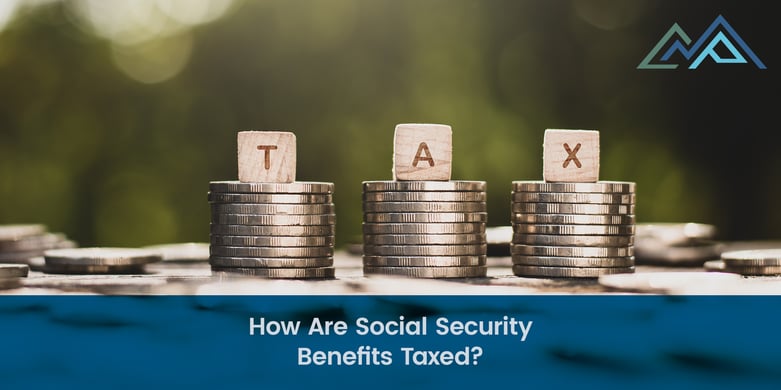This article was first published June 20, 2016. It was extensively updated on December 17, 2019
Most of us dream of retiring one day, but unless you’re lucky enough to be independently wealthy, you’ll probably need to rely on your Social Security benefits to be able to stop working.
At CMP, we know that retirement is a big issue for many of our clients. In fact, one of the most common questions we hear is this one:
How are Social Security benefits taxed?

That’s an essential question to ask. Understanding how Social Security benefits are taxed is crucial for anybody who wants to plan for retirement. The information changes based on your retirement age and your outside income, including self-employment income and taxable interest. As you might expect, it’s a complex issue that can be confusing.
With that in mind, we’ve put together this overview of how Social Security benefits are taxed, including information about how your age affects your benefits and when you can start collecting your Social Security benefits. Here’s what you need to know.
What is Full Retirement Age?
Full Retirement Age is the age at which you are eligible to collect your full Social Security benefits. The laws have changed in recent years and your FRA may vary depending on when you were born. Here’s how it works:
| Year of Birth | FRA |
| Before 1937 | 65 |
| 1938-1942 | Add 2 months for each year after 1937 |
| 1943-1954 | 66 |
| 1955 | 66 & 2 mos. |
| 1956 | 66 & 4 mos. |
| 1957 | 66 & 6 mos. |
| 1958 | 66 & 8 mos. |
| 1959 | 66 & 10 mos. |
| 1960 | 67 |
Waiting until full retirement age to start collecting Social Security is the only way to ensure that you collect the full benefits you’ve earned. Collecting early will reduce your benefits, as we’ll discuss in the next section.
When Can You Start Receiving Social Security Benefits?
The earliest age at which you’re eligible to begin Social Security retirement is 62, regardless of the year you were born (though there are exceptions for total disability). If you begin to collect Social Security before you’ve reached your FRA, then you’ll receive reduced benefits, as follows:
| Age | Percentage of Benefits (Earner) | Percentage of Benefits (Spouse) |
| 62 | 75% (70% for people born after 1959) | 35% |
| 65 | 93.3% | 45.8% |
| FRA/67 | No Reduction | 50% |
You may defer collecting Social Security until you reach the age of 70, and if you do, you can expect to receive a monthly increase based on the number of months over FRA you didn’t collect benefits. However, you should be aware that you will only receive back payments for six months if you choose this option.
Some people choose to wait to collect Social Security benefits because they want the increased monthly benefit. However, since the amount in question is usually rather small, you should base your decision on your overall financial health and retirement plans, not on the promise of increased benefits alone.
How Much Can I Work & Still Receive Social Security Benefits?
You may choose to continue working and still earn Social Security benefits, but there is a reduction in benefits if you earn over the limits set by the Social Security Administration. For 2019, those limits are:
- $17,640 if you are under full retirement age for the entire year
- $46,930 in the year you reach full retirement age
For the first option, your Social Security benefits will be reduced by $1 for every $2 you earn over the limit. For the second option, your benefits will be reduced by $1 for every $3 over the limit, but this number counts only the months before you reached FRA.
You should also keep in mind that your income may be taxable even after you reach FRA if you earn more than the limits laid out by the Social Security Administration. If you choose to work, you will need to be aware of the limits and tax rules so you don’t end up owing taxes.
Are Social Security Benefits Taxed After Age 66?
A lot of taxpayers are mistakenly under the impression that their Social Security benefits aren’t taxed once they reach Full Retirement Age. This comes from confusing the fact that their Social Security benefits will no longer be reduced after Full Retirement Age, with the taxation of the Social Security benefits.
If you don’t have income other than your Social Security benefits, your benefits won’t be taxed. However, if you do have other income—or if your Social Security payments exceed certain limits—then you’ll be required to pay taxes as follows:
AGI = Federal Adjusted Gross Income (can be found on the bottom of page 1 of your personal tax return, Form 1040)
| Filing Status | Combined Income | Taxable Portion |
| Single | $25,000 - $34,000 | Up to 50% |
| over $34,000 | Up to 85% | |
| Married Filing Jointly | $32,000 - $44,000 | Up to 50% |
| over $44,000 | Up to 85% |
|
Adjusted Gross Income (AGI) Combined Income |
For a married couple, the Social Security benefits begin to be included in taxable income/Adjusted Gross Income (AGI) once the combined income reaches $32,000. As shown above, the calculation of combined income includes one-half of the Social Security benefits. Unfortunately, the thresholds in the table above don’t get adjusted for inflation and have been the same for decades.
It is worth noting that married people who file separate tax returns will almost certainly end up paying a Social Security tax. If you’ve been filing separately and are planning to retire, you may want to consider filing a joint return from now on.
The actual tax payable on the Social Security benefits will depend on the taxpayer’s AGI, as well as the available deductions, exemptions, and income tax bracket. Up to 85% of the Social Security benefits may be included in a taxpayer’s taxable income.
Conclusion
Deciding to retire requires a careful assessment of your Social Security benefits as well as an understanding of the tax implications of retirement. While the information in this article provides an overview, it is not comprehensive. It’s always a good idea to consult with an accountant or tax professional if you have questions about Social Security tax.
Are you preparing to retire? Learn how CMP can help you save on your taxes.


















